Israel labels Palestinian NGOs "terror groups". Who did that first? India.
With India, Israel, the UAE and the US now working so closely, they are only likely to borrow more from each other.
Hello everyone,
Last week, India’s Foreign Minister S Jaishankar travelled to Israel on an official visit to meet Israel’s new PM Naftali Bennet. During his visit, he met politicians, business leaders, and spent time with Israelis of Indian origin.
It was his first trip to Israel as Foreign Minister. As always, Jaishankar was full of praise for Israel. He described Israel as “perhaps our most trusted and innovative partner” and “a land with which we have ties of centuries” And as much, this meeting had a lot to do with the consolidation of economic and political ties.
There were two major outcomes from the visit:
1. The resumption of negotiations towards a free trade agreement between the two countries;
2. Formation of what is the beginnings of new elite axis with Israel, the UAE and the US.
This development, although unsurprising given the ties between the four countries over the past two years in particular, is still very, very significant. Jaishankar and his counterpart in Israel held a virtual meeting with the foreign ministers of the US and the UAE, in which they discussed economic cooperation (this much we are told).
Both the Indian and Israeli media have been speculating as to the extent this signaled the formation of a new bloc geared to take on China, fight ‘terror’, or help the US manage the Middle East via remote control. Or all three - the most likeliest. India, Israel and the UAE are building on the gains of the Abraham Accords and consolidating their partnership. This means working closely with each other and helping one another accomplish goals. For instance, just days after the meeting, the UAE announced it would be building infrastructure in Kashmir, effectively enabling India’s settler-colonial project there since the abrogation of Article 370 in August 2019. Likewise, India is investing in Israeli startups, and Israel is helping build India’s arms industry, etc, etc.
And what about the Palestinians, you ask? Well, they certainly do not feature in any of this. And that is part of the plan.
Definitely watch this space.

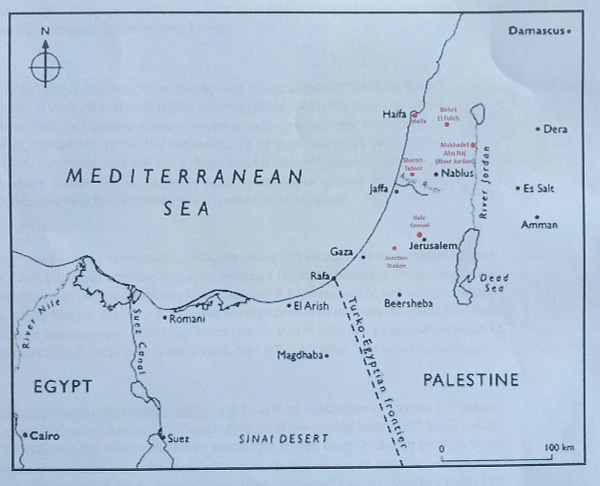
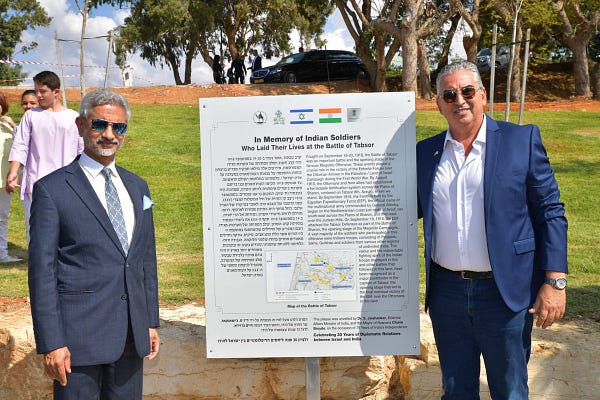
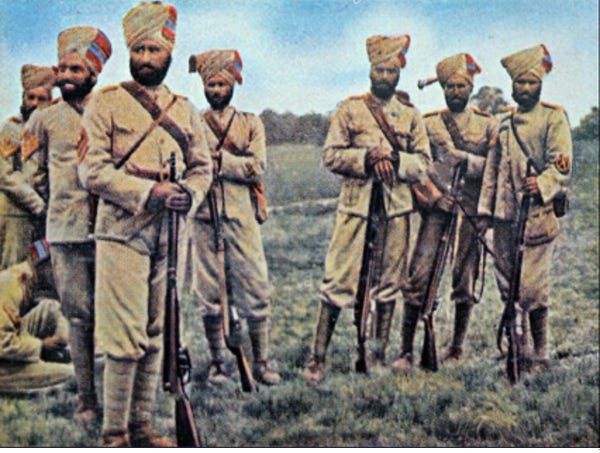
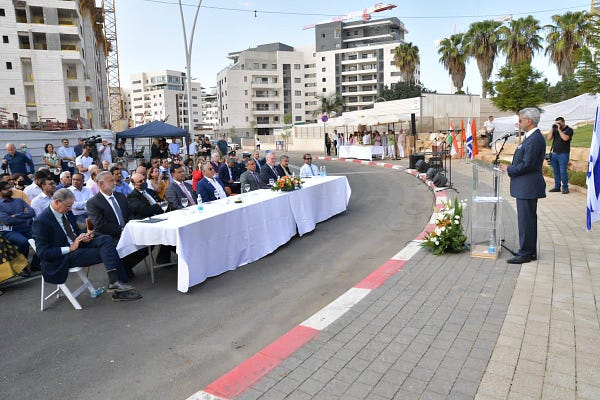
During his visit to Tel Aviv, Jaishankar was hosted by Tel Aviv University (TAU), who announced that it would be expanding its partnership with Indian universities. There are currently around 1000 Indians studying in Israel. In its East Asian Studies department, courses in Sanskrit and Hindi are taught.
In other developments:
This week, Israel’s new ambassador to New Delhi, Naor Gilon, presented his credentials to the Indian government. Likewise, Jonathan Zadka, the new consul-general to south India has also made his way to Bengaluru (he has already started tweeting out photos of his breakfast); Read a fascinating interview with him here.
And finally, Is Israel now copying Indian methods in Kashmir?
On Oct 24, the Israeli government labeled six Palestinian NGOs as fronts for terror groups. These include: Al-Haq, a human rights organisation that works with the United Nations, the Union of Agricultural Work Committees, the Bisan Centre for Research and Development, the Union of Palestinian Women’s Committees and Defense for Children International - Palestine and Addameer, which supports Palestinian political prisoners.
This was how the Israeli government explained their actions:
“These organisations operated under the guise of 'civil society organisations', but in practice belong to and form an arm of the organisation's leadership, the purpose of which is to destroy Israel while taking part in terrorist acts.”
The move has been widely seen as a way to muzzle and criminalize the work of Palestinian civil society.
Here is Omar Shakir, Human Rights Watch's Israel and Palestine director: "It is a brazen attack, a dangerous escalation that threatens to entirely cripple the work of Palestinian civil society in opposing Israeli human rights abuse."
Though repressing Palestinians has been the Israeli method since 1948, Jonathan Pollack argues that “this new assault on Palestinian civil society may be unprecedented in both its magnitude and its goals, without even the slightest attempt to disguise it.”
The move also appears suspiciously similar to India’s crushing attempts to intimidate and cripple activism in Indian-occupied Kashmir.
In October 2020, India’s premier anti-terror agency, raided the offices (and homes) of activists working at the Jammu and Kashmir Coalition of Civil Society (JKCCS), the home of Parveena Ahangar, the Chairperson of the Association of Parents of Disappeared Persons (APDP) and the NGOs Athrout and GK Trust as well as the residence of Agence France-Presse’s Kashmir correspondent Parvaiz Bukhari.
This was how the Indian government explained their actions:
“The raids were conducted based on ‘credible information’ that the organizations have been using funding from India and abroad ‘for secessionist and terrorist activities in J&K’, in contravention of the Unlawful Activities (Prevention) Act (UAPA) and Foreign Contribution (Regulation) Act (FCRA), India’s primary anti-terror and foreign funding laws.”
Like the Israelis, the Indians provided no evidence of such.
The Indian government has been able to use FCRA consistently to muzzle NGOs, be it in India or in Indian-occupied Kashmir, with the tacit support of the US.
A leaked diplomatic cable via wikileaks showed that in 2008, American officials welcomed a move to amend the Act to allow government to revoke permits of NGOs designated as “organizations of a political nature.” This is what the US treasury official said:
“India's proposed amendments under the FCRA reflect considerable thinking on the issue and would provide an excellent example to other countries in South Asia region and hopes that India would provide input and leadership for any events.”
Amnesty International added that “since 2014, several organizations have been targeted under the foreign funding law, including Greenpeace India, Lawyers Collective, Centre for Promotion of Social Concerns, Sabrang Trust, Navsarjan Trust, Act Now for Harmony and Democracy, NGO Hazards Centre, and Indian Social Action Forum.”
And the impact on activism, press freedom and civil society in Indian-occupied Kashmir as well as in India has been catastrophic.
Last week, the US claimed that they were caught unawares by Israel’s decision to label the groups terrorists.
But as the Wikileaks cable shows - had they known - would it have actually changed anything? And now with India, Israel, the UAE and the US now working so closely together, it is ever more likely they are going to borrow even more from each other.
Until next time,
Azad
Bonus track: The curry queen of Israel.



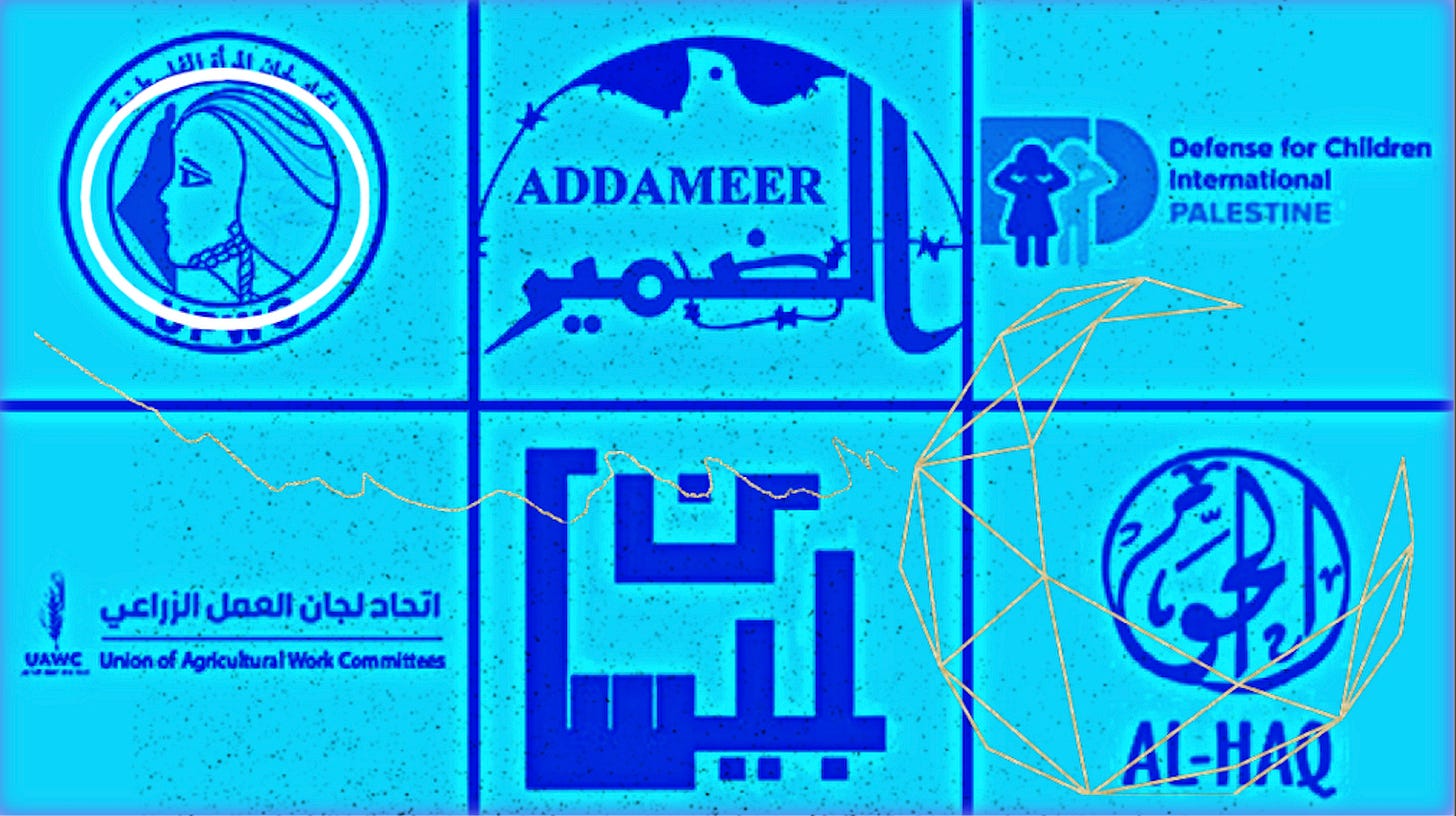
Thank you!